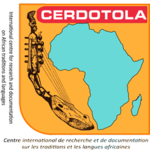Celebration of the International Day of Archives (JIA 2017)
CERDOTOLA strives after the virtual reconstitution of the history of African people.
At the moment when the international community is celebrating the international day of Archives on June 9th, it is appropriate to give back to these memorial institutions the full role that they hold in the global society of knowledge even though this role is not always well-known.
The fate of a large number of Cameroonian archives (for examples) is unfortunately the evidence of the lack of interest for these infrastructures of knowledge: devastated by the obsolescence of their building in some cases and plundered or neglected in other cases. They also lack of staff and financial resources for their maintenance or regeneration.
And yet beside libraries and museums, archives are incontestably the base upon which knowledge is built up, spread and renewed through ages and generations. The advent of digital technologies has amplified this strategic role at the point which the memorial trilogy built around libraries, museums and archives tend to form all around the same main core: digital archives.
Indeed, the dematerialization of information mediums, the eventual aggregation of documentary objects (text, video, audio, graphic, animation, enhanced reality, etc.) have definitely set the Digital Archives into orbit as contemporary industries of knowledge and memory. Moreover, the emergence of the Anglo-Saxon term “Digital Library” to designate a set of digital practices aiming to the information virtualisation and networking has created a new conception of documentary information from its mobilization to its consumption via its organization, preservation and availability.
How we not praise the avant-gardist vision of CERDOTOLA which has firmly embraced the dynamics of the digital revolution by acquiring a modern archival infrastructure? Archives of Languages and Oral Resources of Africa better known as ALORA constitute at the present the only infrastructure of that kind in the entire Africa. They house documentary collections more and more important originating as well as from the scan of analogic or paper mediums or from documentation activities through which are generated the so-called “digital-born objects”. Some of these collections deserve to be named:
-
ALCAM collection which comprises words lists compiled during the 70-80s in the framework of the project Linguistic Atlas of Central Africa (ALAC) and then the project Linguistic Atlas of Cameroon (ALCAM).
-
The musical collection EMAC (Ethno-musicology of Central Africa) housing heritage music collected during the 80s in Democratic Republic of Congo (Zaire), Rwanda, Gabon, Congo Brazzaville, Burundi, Central African Republic and Cameroon.
-
The multimedia collection of the Languages and Cultures Department of Cameroon of Ecole Normale Supérieure of the University of Yaoundé I.
-
The collection of KPAAM-CAM (Key Multidisciplinary Approaches in African Multilingualism- Cameroon) project that houses video, audio and photo recordings that reference the social and cultural practices of Lower Fungong people from the North-West of Cameroon.
-
The collection the Documentation project on the Language and oral traditions of the Bati people.
-
The multimedia collection of the Institute of African Languages (ILA) of Houphouët Boigny University in Abidjan.
Moreover, ALORA is member of the International Digital Archives called DELAMAN (Digital Endangered Languages and Music Archives Network: http://www.delaman.org/members/alora/ ).
In addition of being a place of memory and of industry of knowledge, Digital Archives seem to be mandated with the task to become a virtual place of instructive entertainment; like the Digital Archives of Languages of Pacific (PARADISEC: http://wwwparadisec.org.au/), ALORA has the ambition to digitally recreate the history of African people, migratory paths, ancestral life styles etc. by digitalizing the results of field research and combining to them technological prowess that aim to create an “increased reality”.
The achievement of such an ambition will passes through the awareness of the large public and scientific and cultural stakeholders on the need to integrate digital practices in their work approach. The days of disciplinary and institutional separation has to be replaced by a place of mutualisation, of sharing, re-use and heuristic re-investment. It is only in these conditions that the Digital Archives will fully hold their role as knowledge and appreciation incubators for the emergence of our continent.
Emmanuel Ngué Um (Chef du Projet ALORA)
http://alora.cerdotola.org/



Présentation du serveur ALORA lors de la Conférence Internationale du CERDOTOLA 2015, Juin 2015

